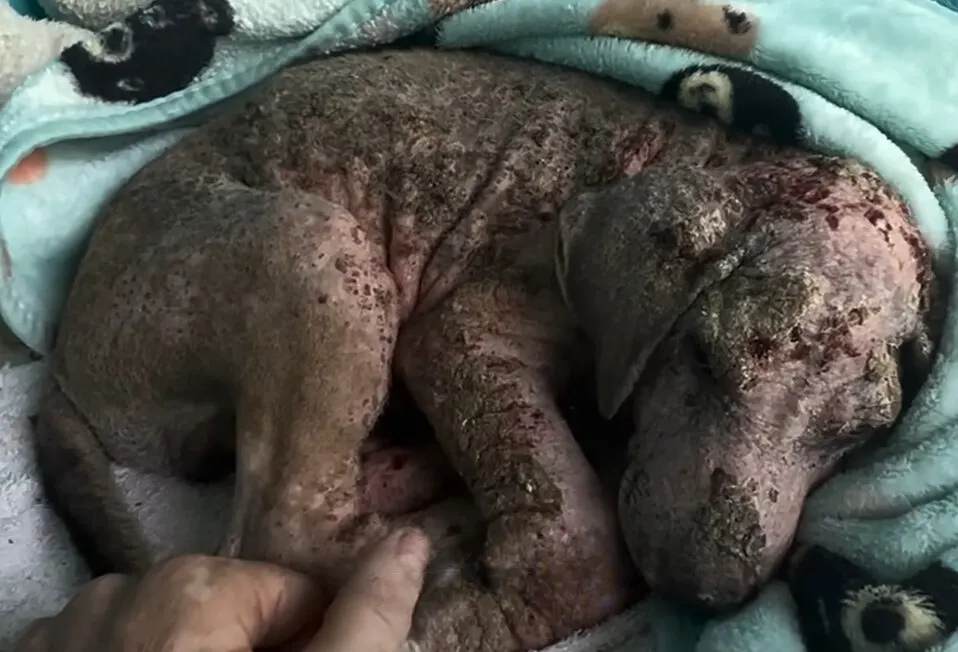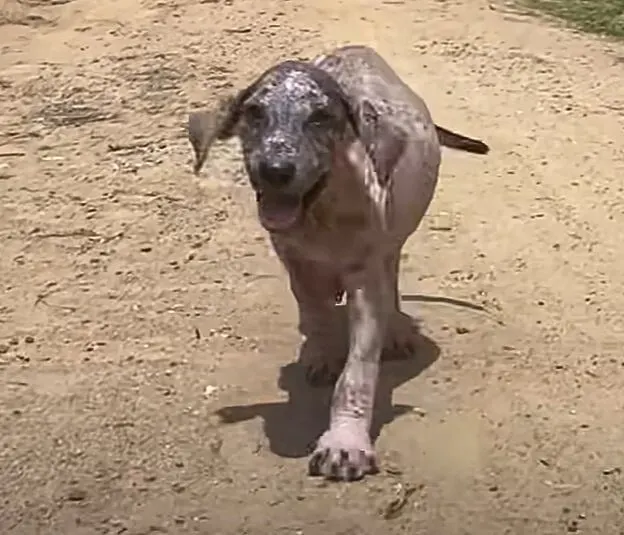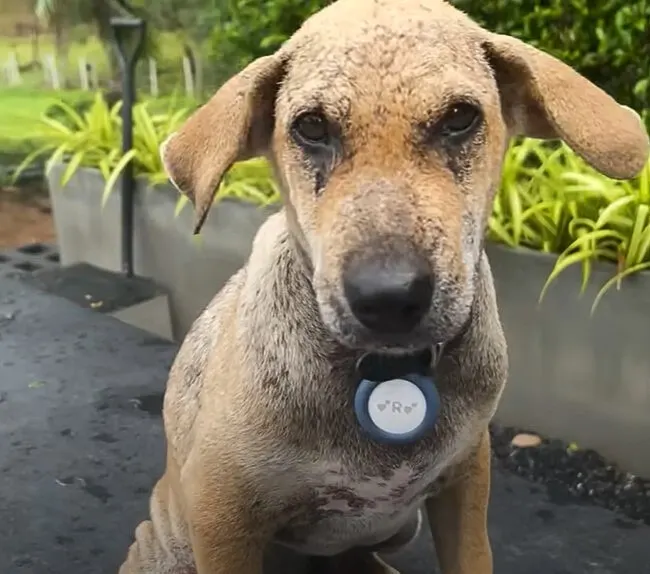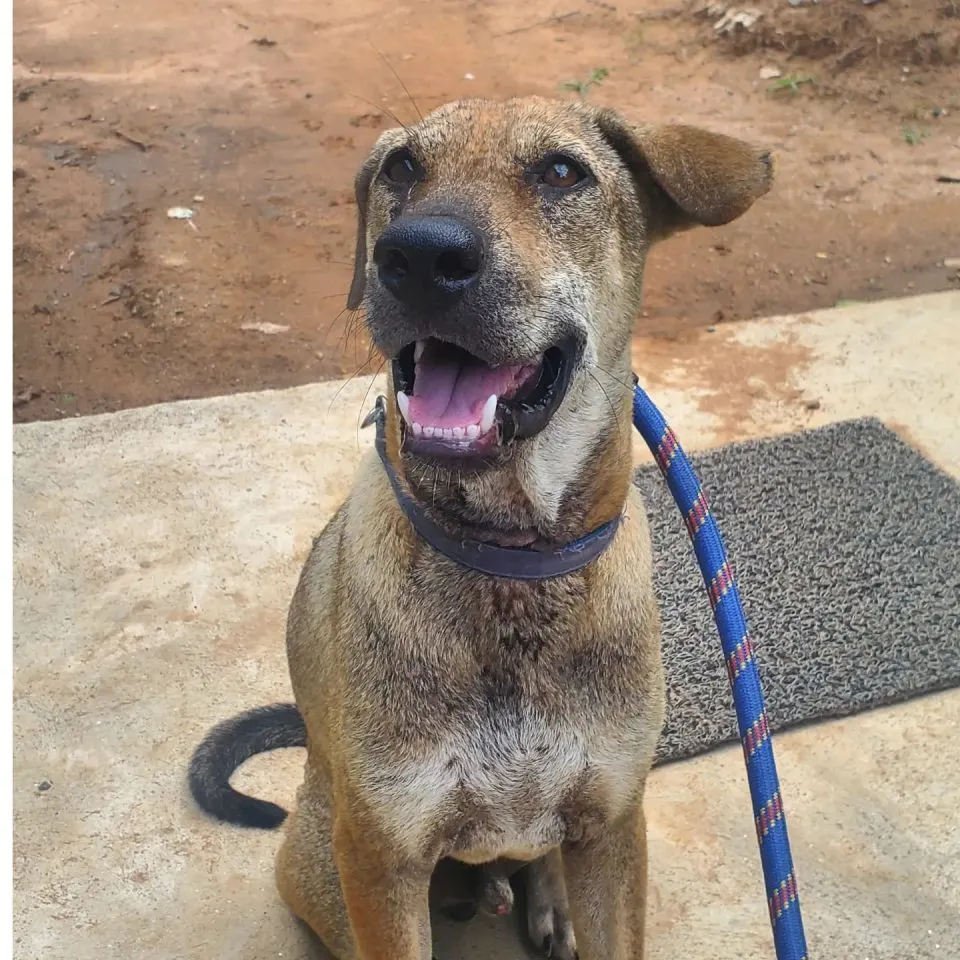When Niall Harbison, a dog rescuer, saw a hairless little puppy for the first time, his heart sank. The pup was in such a bad state that Niall didn’t think he could make it.
His friend, Jules, found the puppy, who was later named Rodney, on the streets and brought him to Niall. Rodney looked very weak and he couldn’t even stand on his paws. His whole body was covered in mange.
Niall couldn’t sleep during the first few nights because he was very worried about the little pup. He kept checking on him, hoping that he was still alive.
Rodney’s Rescuer Doesn’t Let Him Give Up

After the pup made it through the first night and started eating, Niall felt a bit relieved. He talked to Rodney every day and encouraged him not to give up.
While he was lying curled up in his blanket without being able to stand up, Rodney was listening to his hero. His loving care and his reassuring words gave him strength to continue fighting for his life.
After a couple of days passed, Niall could breathe a sigh of relief because Rodney was able to stand on his own. The resilient puppy proved to be a real fighter.
Two weeks later, Niall took sweet Rodney to meet the other dogs. They sniffed Rodney and welcomed him with their wagging tails.

Rodney was glad to be accepted, and he happily began exploring his surroundings. Everything was new to him.
“He was very inquisitive, he was just sort of taking it in ‘cause it was a big huge world out there for him,” Niall said.
Niall enjoyed getting to know Rodney’s personality. He was such an adorable pup who had so much love to give. He covered his foster dad with kisses.
The Puppy’s Fur Keeps Surprising Niall

When Rodney’s fur began growing, Niall couldn’t stop checking its colour every day. Just when he was convinced that the puppy’s fur would be golden brown, he noticed Rodney’s white fur coming in.
“One thing that surprised me was his fur. Even on his little cheeks. He kept changing colour all the time,” Niall said.
The delightful pup’s colour ended up being silver-grey mixed with brown.
Thanks to Niall’s immense love and care, the puppy transformed into a delightful canine who is ready to enjoy life.
Rodney Lives The Happiest Life

After Rodney spent three months with Niall, he found him a great family who fell in love with him at first sight. The delightful pup was thrilled to meet them.
Before he left with his parents, Niall kissed Rodney goodbye, wishing him all the happiness of this world.
He was amazed by Rodney’s case and he felt overjoyed after seeing that the puppy had the best life.

“Seeing cases like Rodney just really blow my mind. It makes everything I do worth it. I mean, he goes from a little, tiny scrap of a dog, barely clinging onto life to the center of a family that are just in love with him and adore him and he has a wonderful life,” said Niall.
Rodney’s family, along with his doggy brother, love him immensely.
Rodney often posts updates about his everyday activities and adventures on the Instagram account he shares with his brother. The two siblings enjoy playing in the yard and going hiking. They are having the time of their lives.
If your furry companion is leaving you puzzled with bouts of vomiting, it can be concerning. As a seasoned dog trainer, navigating the reasons behind your dog’s upset stomach is crucial for their well-being. Understanding the triggers behind this unpleasant issue is key to helping your pup feel better and ensuring their health is in top shape.
When your dog starts vomiting, it’s like they’re trying to communicate something to you. From dietary indiscretions to underlying health issues, the reasons can vary. As a responsible pet owner, being able to decipher these signals is essential in providing the best care for your four-legged friend. Let’s delve into the common causes and ways to address this worrisome behavior, so you can support your dog through any tummy troubles they may be facing.
Understanding Why Your Dog Is Vomiting
Common Causes of Vomiting in Dogs
When your furry friend starts vomiting, several reasons could be behind it. Some common causes include:
- Dietary Indiscretions: If your dog ate something they shouldn’t, it could lead to vomiting. This could be anything from garbage to toxic foods like chocolate.
- Gastrointestinal Issues: Problems like gastritis or an intestinal blockage can trigger vomiting episodes in dogs.
- Infections: Viral or bacterial infections can upset your dog’s stomach, causing them to vomit.
- Allergies: Just like humans, dogs can have allergies too. Food or environmental allergens might prompt vomiting.
- Medication Side Effects: Some medications can cause stomach irritation in dogs, leading to vomiting as a side effect.
Differentiating Between Vomiting and Regurgitation
It’s crucial to understand the difference between vomiting and regurgitation when it comes to your dog’s health:
- Vomiting: When your dog vomits, there is an active contraction of abdominal muscles, and the content comes from the stomach, usually with food particles.
- Regurgitation: This is a passive process where food comes from the esophagus without abdominal effort, often in tube-like form, without any digested signs.
Knowing these distinctions can help you and your vet pinpoint the issue more accurately and provide the right treatment for your pet’s well-being.
Assessing Your Dog’s Condition
When to Worry About Your Dog’s Vomiting
If your dog vomits infrequently and seems otherwise fine, it might not be a cause for concern. However, you should pay attention if the vomiting becomes frequent or is accompanied by other symptoms like lethargy, diarrhea, abdominal pain, or blood in the vomit. In such cases, it’s essential to consult your veterinarian to rule out any serious underlying issues. Keep an eye on your dog’s overall behavior and well-being to gauge the severity of the situation.
Signs That Your Dog Needs Immediate Veterinary Attention
Certain signs indicate that your dog requires urgent medical care for vomiting. If your dog is vomiting persistently, has a bloated abdomen, shows signs of weakness, dehydration, or collapses, it’s crucial to seek immediate veterinary attention. Additionally, if your dog has ingested a toxic substance, foreign object, or is retching but not producing vomit, prompt professional intervention is necessary. Trust your instincts; if you feel your dog’s condition is severe, don’t hesitate to seek professional help to ensure your furry friend receives the care they need promptly.
Avoid delays; seek professional assistance if your dog shows alarming symptoms like frequent vomiting, weakness, or signs of distress after ingesting a harmful substance. Be proactive in addressing your dog’s health concerns to maintain their well-being.
At-Home Care for a Vomiting Dog
Dietary Changes and Fasting
If your dog is vomiting, one helpful approach is to make dietary changes by feeding bland food like boiled chicken and rice. Fasting for 12-24 hours can also aid in resting the digestive system. This can help in resolving mild stomach upsets that may be causing the vomiting.
Hydration and How to Maintain It
It’s crucial to ensure your dog stays hydrated, especially if vomiting. Offer small amounts of water frequently or consider ice cubes for them to lick. Electrolyte solutions can also be beneficial, but avoid giving them without consulting your vet first. Dehydration can worsen vomiting, so monitoring and maintaining your dog’s hydration levels are essential for their recovery.
The Role of Diet in Dog Vomiting
Foods That Can Cause Vomiting
When it comes to your dog’s diet, certain foods can trigger vomiting. Some common culprits include rich or fatty foods like bacon, which may be hard for your dog to digest. Additionally, foods like chocolate, grapes, onions, and garlic are toxic to dogs and can lead to vomiting. Always be cautious about what you feed your furry friend.
How to Choose a Digestion-Friendly Dog Food
Choosing the right dog food is essential for your pet’s digestive health. Look for high-quality, easily digestible options that are formulated specifically for dogs. Opt for foods with named animal protein sources like chicken or beef and avoid those with vague ingredients. Remember, a balanced diet is key to keeping your dog healthy and reducing the chances of vomiting episodes.
When to See the Vet
Diagnostic Tests for Vomiting Dogs
If your dog is vomiting persistently, the vet may recommend diagnostic tests to get to the root of the issue. These tests can include blood work, x-rays, ultrasounds, or even endoscopy to examine the gastrointestinal tract. Through these tests, the vet can identify underlying health conditions causing the vomiting and tailor the treatment accordingly.
Potential Treatments for Vomiting
Treatment options for vomiting dogs vary based on the cause. Your vet may suggest medications to control vomiting, antibiotics for infections, or dietary changes to address food sensitivities or allergies. In severe cases, hospitalization for intravenous fluids or surgery for foreign body removal might be necessary. Follow your vet’s instructions carefully to help your furry friend recover effectively.
Conclusion
So, there you have it – understanding why your furry friend is vomiting is crucial. Remember to keep an eye on their symptoms and seek help if things seem off. Your vet can recommend the best course of action and provide the necessary treatment. Stay vigilant, follow their advice, and your pup will be back to their playful self in no time.
Frequently Asked Questions
What are the common reasons behind dog vomiting?
Dogs can vomit due to various reasons such as dietary issues, infections, medication side effects, or underlying health conditions.
How can I differentiate vomiting from regurgitation in dogs?
Vomiting involves active abdominal contractions, while regurgitation is a passive process where food is expelled without effort.
When should I seek veterinary help for my vomiting dog?
It is advisable to consult a vet if your dog vomits frequently, shows signs of lethargy, blood in vomit, or if vomiting is persistent.
What diagnostic tests may be recommended for a dog with frequent vomiting?
Diagnostic tests such as blood work, x-rays, ultrasounds, or endoscopy may be suggested by the vet to determine the underlying cause of vomiting.
What treatment options are available for dogs suffering from vomiting?
Treatment options may include medications, antibiotics, dietary changes, and in severe cases, hospitalization as advised by the vet.
[no_toc]

Hey there, I’m Janet Brooks, a dog-loving student from California. I’m all about helping pups in need, especially those without homes. Me and my awesome friends work together to give shelter and love to stray dogs. Oh, and I also write blogs about dogs to share helpful info.